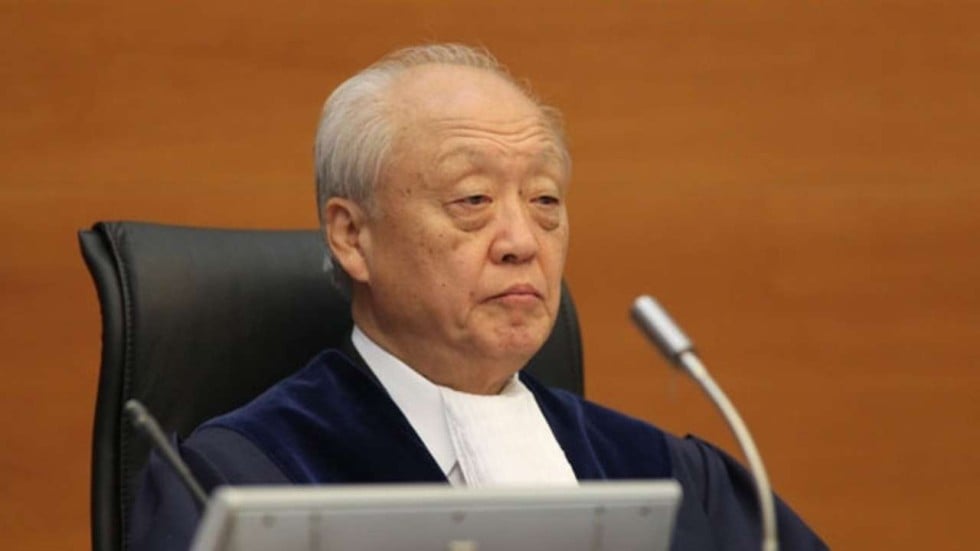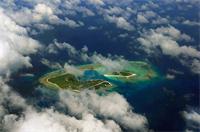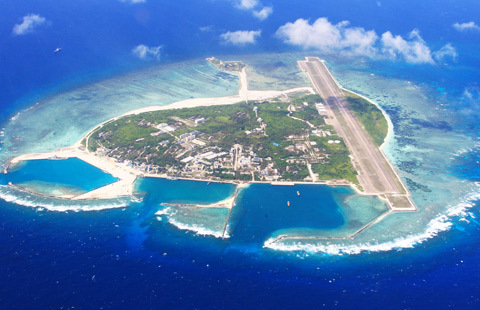
China issues white paper on settling disputes with Philippines in South China Sea
The Chinese government has issued a white paper on the
arbitration ruling. It contains more than 20,000 Chinese characters and
says the Philippines' territorial claim over part of the Nansha Islands,
is groundless from the perspective of either history or international
law.
Full Text: Chinese version;English version;French version
BEIJING, July 13, 2016 (Xinhua) -- Photo taken on July 13, 2016 shows the white paper titled "China Adheres to the Position of Settling Through Negotiation the Relevant Disputes Between China and the Philippines in the South China Sea" issued by Chinese government in Beijing, capital of China. "The Philippines' territorial claim over part of Nansha Qundao is groundless from the perspectives of either history or international law," said the document issued by the State Council Information Office on Wednesday. (Xinhua/Chen Yehua)
BEIJING, July 13 (Xinhua) -- The Chinese government on Wednesday issued a white paper to expound on its position, which calls for settling relevant disputes between China and the Philippines in the South China Sea through negotiation.
"It is the Philippines that has created and stirred up trouble," said Vice Foreign Minister Liu Zhenmin at a press conference held Wednesday to introduce the white paper.
"Violating bilateral consensus in recent years, the Philippines has repeatedly taken moves that complicate and intensify relevant disputes between China and the Philippines in the South China Sea," he said.
The white paper, titled "China Adheres to the Position of Settling Through Negotiation the Relevant Disputes Between China and the Philippines in the South China Sea," was published one day after an award was issued in arbitration unilaterally initiated by the previous Philippine government.
Describing the award as "a piece of waste paper," Liu urged other countries not to "take the opportunity to threaten China."
China hopes other countries can work with it to protect the peace and stability of the South China Sea and "not let the South China Sea become the origin of a war," he said.
The vice minister also said China reserves the right to declare an Air Defense Identification Zone (ADIZ) in the South China Sea in accordance with the extent of the threat.
The white paper issued by the State Council Information Office stated that the core of the relevant disputes between China and the Philippines in the South China Sea lies in the territorial issues caused by the Philippines' invasion and illegal occupation of some islands and reefs of China's Nansha Qundao (the Nansha Islands).
As the international law of the sea developed, a maritime delimitation dispute also arose between the two states regarding certain areas of the South China Sea, it added.
"The Philippines' territorial claim over part of Nansha Qundao is groundless from the perspectives of either history or international law," it said.
The two countries held multiple rounds of consultations on the proper management of disputes at sea and reached consensus on resolving relevant disputes through negotiation and consultation, which has been repeatedly reaffirmed in a number of bilateral documents, according to the white paper.
In 2013, the then-government of the Republic of the Philippines unilaterally initiated the South China Sea arbitration.
By doing so, the Philippines has violated its standing agreement with China to settle relevant disputes through bilateral negotiation, violated China's right to choose means of dispute settlement of its own will as a State Party to the United Nations Convention on the Law of the Sea (UNCLOS), and abused the UNCLOS dispute settlement procedures, it said.
"The Arbitral Tribunal established at the Philippines' unilateral request has no jurisdiction over relevant submissions, and awards rendered by it are null and void and have no binding force," said the document.
"China's territorial sovereignty and maritime rights and interests in the South China Sea shall under no circumstances be affected by those awards. China does not accept or recognize those awards. China opposes and will never accept any claim or action based on those awards," it added.
The white paper also explained that Nanhai Zhudao (the South China Sea Islands) are China's inherent territory, saying the activities of the Chinese people in the South China Sea date back more than 2,000 years.
China is the first to have discovered, named, explored and exploited Nanhai Zhudao and relevant waters, and the first to have continuously, peacefully and effectively exercised sovereignty and jurisdiction over them.
"China's sovereignty over Nanhai Zhudao and relevant rights and interests in the South China Sea have been established in the long course of history, and are solidly grounded in history and law," it said.
China abides by the purposes and principles of the Charter of the United Nations and is committed to upholding and promoting international rule of law. It respects and acts in accordance with international law, the white paper said.
While firmly safeguarding its territorial sovereignty and maritime rights and interests, China adheres to the position of settling disputes through negotiation and consultation and managing differences through rules and mechanisms, it added.
"China endeavors to achieve win-win outcomes through mutually beneficial cooperation, and is committed to making the South China Sea a sea of peace, cooperation and friendship," it said.
In the white paper, China urges countries outside the region to respect the efforts by countries in the region and to play a constructive role in maintaining peace and stability in the South China Sea.
During the press conference, Liu reiterated that settling relevant disputes between China and the Philippines in the South China Sea through negotiation is the theme of Wednesday's white paper, as well as the policy of the Chinese government.
"We hope to work with countries surrounding the South China Sea, including ASEAN members, abide by the Declaration on the Conduct of Parties in the South China Sea (DOC), and maintain peace and stability as well as the freedom of navigation and overflight in the South China Sea," Liu said.
Liu noted that this policy has not changed and will not change. He called on the Philippines to return to the track of negotiation, saying it is the only solution to resolve disputes. - Xinhua
China issues white paper on settling disputes with the Philippines
Manila wants to entrench illegal occupation of islands and reefs
Beijing: The Philippines has repeatedly taken moves that have complicated the maritime disputes in an attempt to “entrench its illegal occupation of some islands and reefs” of the South China Sea, said a whitepaper issued by China.
The whitepaper, released yesterday by China’s State Council Information Office, accused the Philippines of “having increasingly intensified its infringement of China’s maritime and interests”.
“The Philippines also has territorial pretensions on China’s Huangyan Dao and attempted to occupy it illegally,” said the whitepaper, which has elaborated the current situation and China’s policy on the South China Sea issue.
The five-chapter whitepaper was released after the Arbitral Tribunal under the United Nations Convention on the Law of the Sea (Unclos) in The Hague, announced on Tuesday that China has no “historic title” over the South China Sea.
The Philippines’ unilateral initiation of arbitration is “an act of bad faith”, said the whitepaper.
China maintains that peace and stability in the South China Sea should be jointly upheld by China and Asean member states, said the whitepaper.
China’s Foreign Ministry said in a statement released on Tuesday that the ruling “is null and void and has no binding force”.
Beijing issued two statements immediately after the arbitration ruling was announced. Noting that Chinese activities in the South China Sea date back more than 2,000 years, one statement pointed out that China is the first to have discovered, named, explored and exploited the South China Sea Islands and surrounding waters.
President Xi Jinping said on Tuesday that China is committed to resolving disputes through direct negotiations, but its national sovereignty and maritime interests will not be influenced under any circumstances by the South China Sea ruling.
The South China Sea Islands have been China’s territory since ancient times, and China refuses to accept any claims or activities based on the arbitral ruling, Xi said while meeting in Beijing with European Council president Donald Tusk and European Commission president Jean-Claude Juncker.
Australian Foreign Minister Julie Bishop said that China must accept a verdict declaring its South China Sea claims are invalid that the government and needs to halt its artificial island building in the disputed waters.
She added that Beijing risked reputational harm if it ignored the ruling.
“We call on both the Philippines and China to respect the ruling, to abide by it. It is final and legally binding on both of them,” Bishop told national broadcaster ABC.
“This treaty, the Law of the Sea, codifies pre-existing international custom. It’s a foundation to maritime trade and commerce globally, and so to ignore it would be a serious international transgression.
“There would be strong reputational costs. China seeks to be a regional and global leader and requires friendly relations with its neighbours. That’s crucial to its rise.”
China warned other countries yesterday against threatening its security in the South China Sea.
Vice-Foreign Minister Liu Zhenmin said while introducing the policy paper that Beijing could declare an air defence identification zone over the waters if it felt threatened, a move that would sharply escalate tensions.
But Beijing also extended an olive branch to the new Philippine government, saying the South-East Asian nation would benefit from cooperating with China. — China Daily/Asia News Network/Agencies
South China Sea ruling angers Republic of China, Taiwan
https://youtu.be/P2Y64msySxI
TAIPEI: President Tsai Ing-wen vows to defend Taiwan’s sovereignty after the ruling from The Hague.
Tsai boarded a South China Sea-bound warship and addressed its crew while touring a naval base yesterday morning, less than a day after a controversial international ruling on the area.
“This vessel represents the Republic of China and the uniform that you are wearing represents what Taiwanese citizens have entrusted to you,” Tsai told crew members on the deck of the Kang Ding-class frigate, which departed on the routine patrol mission soon afterwards.
In addition, Tsai said, the patrol represents Taiwanese citizens’ determination to safeguard the country’s interests.
The rare presidential tour of a warship came after an arbitral tribunal in The Hague on Tuesday deemed South China Sea formations that are key to Chinese territorial claims to be rocks, rather than islands.
While Taiwan was not a party to the case, the ruling is problematic as it included Taiping Island (also known as Itu Aba) and other locations claimed by the government.
Tsai noted that the routine patrol was being launched a day ahead of schedule and said that its significance was unlike that of any previous mission, saying the situation in the South China Sea had changed on Tuesday.
“We have always sought to see the disputes in the South China Sea be settled peacefully through multilateral negotiations,” she said.
“We are also willing, through negotiations conducted on the basis of equality, to work with all states concerned to advance peace and stability in the South China Sea.” — The China Post/Asia News Network
 China's Response to the South China Sea Arbitration Ruling
China's Response to the South China Sea Arbitration Ruling
Center for Strategic & International Studies
Arbitral court not a UN agency
Arbitral Tribunal on South China Sea Disputes not Primary Judicial Branch of UN: Former ICJ Judge
Earlier we spoke to Professor Zhu Feng, executive director
of the China Center for Collaborative Studies of the South China Sea at
Nanjing University. He explained more about the legitimacy of the
tribunal in the Hague to issue the award in the South China Sea case.
The United Nations said on Wednesday it has nothing to do with the Permanent Court of Arbitration, which set up a tribunal that handled the South China Sea arbitration case the Philippines filed unilaterally in 2013.
In a post on its Sina Weibo micro blog, the UN said the PCA is a "tenant" of the Peace Palace in The Hague, "but has nothing to do with the UN".
The UN said the International Court of Justice, its principal judicial organ set up according to the Charter of the UN, is also located in the Peace Palace.
The construction of the palace was managed by the Carnegie Foundation, which is still the building's owner and manager, according to the Peace Palace website.
The UN said it makes an annual donation to the foundation for using the Peace Palace.
When asked about the Arbitral Tribunal's case's ruling on Tuesday, Stephane Dujarric, spokesman for UN Secretary-General Ban Ki-moon said on Tuesday "The UN doesn't have a position on the legal and procedural merits" of the South China Sea arbitration case.
In response, Foreign Ministry spokesman Lu Kang said China will, as always, observe the goals and principles set up by the Charter of the UN, and solve maritime disputes peacefully by having talks with countries directly involved, "on the basis of firmly guarding China's territorial sovereignty and maritime interests".
Lu said: "China is a responsible member of the international community. It's an important advocate and loyal implementer of the UN's cause to push forward the international rule of law."
Li Jinming, a professor of international maritime law at Xiamen University, pointed out that the use of terms such "UN tribunal" or "UN-backed tribunal"-frequently reported by Western media-is incorrect, as they confuse the PCA with the UN's ICJ.
Wang Hanling, a maritime law researcher at the Chinese Academy of Social Sciences, said some countries and news media are "deliberately" confusing the tribunal with the ICJ.
China questions neutrality of judges

PETALING JAYA: China has questioned the neutrality and appointment of judges of an arbitral tribunal in The Hague which ruled in favour of the Philippines over their Spratly Islands dispute.
Selection Dispute: China is crying foul over appointments made by Shunji Yanai.
China Foreign vice-minister Liu Zhenmin questioned the “procedural justice” of the appointment and the operation of the tribunal, South China Morning Post reported.
The tribunal was formed after the Philippines filed a case with the International Tribunal on the Law of the Sea (ITCLOS) in 2013 after a stand-off with China at the Scarborough Shoal the previous year.

Of the five judges, one was selected by the Philippines and the rest by Shunji Yanai (pic), the then president of ITCLOS, which was established under the United Nations Convention on the Law of the Sea. This was reportedly due to China’s refusal to take part or recognise the tribunal.
Yanai was not among the panel of arbitrators.
“Leaving aside the obvious violation of procedural justice, we can hardly make a better explanation of judge Yanai’s motivation and purpose other than that he did it on purpose,” Liu said.
Born in Tokyo on Jan 15, 1937, Yanai read law at the University of Tokyo.
He served in the foreign ministry and was Japan’s ambassador to Washington.
He was also chairman of a panel which advised Japan’s government to revise its constitution to allow military action overseas.
The arbitral tribunal on Tuesday ruled that China had violated the Philippines’ sovereign rights in its Exclusive Economic Zone through its large-scale activities in the South China Sea.
The tribunal arbitrators included Thomas A. Mensah of Ghana, Jean-Pierre Cot of France, Stanislaw Pawlak of Poland, Prof Alfred H.A. Soons from Holland and Rüdiger Wolfrum from Germany. -
By Wang Qingyun (China Daily)
Who is Shunji Yanai?
Fire has been focused on the person who picked the arbitrators – Japanese judge Shunji Yanai, who has been branded a “rightist” and “unfriendly to China”.
Foreign Vice-minister Liu Zhenmin questioned the “procedural justice” of the appointment
China has refused to take part in the proceedings, and in its absence, four of the five arbitrators were appointed by Yanai, who at the time the case was filed in 2013 was president of the International Tribunal for the Law of the Sea (ITLOS), established under the UN Convention on the Law of the Sea. The other one was named by the Philippines.
Yanai should have avoided involvement given the territorial and maritime disputes between China and Japan in the East China Sea, and Tokyo’s attempts to involve itself in the South China Sea issue.
Yanai has long been a figure of scorn among nationalist Chinese. A commentary by Xinhua described Yanai, a former senior Japanese foreign ministry official who also served as the country’s ambassador to Washington, as a “typical rightist, hawkish figure”.
In 2007, during Shinzo Abe’s first term as Japanese prime minister, Yanai served as chairman of a panel set up to advise Abe on his plan to revise the constitution to allow military action overseas. “South Korea also expressed its concerns over Yanai’s presidency of ITLOS as it also has territorial disputes with Japan,” Xinhua said.
Soon after the appointment of the tribunal, Yanai told Japanese broadcaster NHK that the islands of Japan were under enemy threat, according to a research report by the Chinese Initiative on International Law, a Hong Kong and Hague-registered NGO whose members are legal professionals and academics.
Although Yanai did not explicitly name the “enemy”, such a statement was clear enough for China to raise concerns over his impartiality in the case, the report said.
In his article in Qiushi, Liu also cast doubt on the make-up of the tribunal, saying none of the five judges – one African and four Europeans – had knowledge of the history and international order of ancient East Asia.
But Yanai’s involvement could have been avoided. If China had decided to take part in the proceedings, it could have named one of the tribunal’s arbitrators and jointly appointed three others in agreement with the Philippines.
Blustering US a paper tiger in S.China Sea
After the illegally organized arbitration tribunal issued the award in the South China Sea arbitration Tuesday, the US voiced the strongest support for it. Spokespersons from both the US Department of State and the White House successively claimed that the award was legally binding. More politicians and congressmen from the House and Senate have also made fiercer remarks, demanding regular challenges to China's excessive maritime claims through naval and air patrols. Japan's stance is precisely the same as that of the US, as if they have discussed their lines.
On the contrary, the Philippines' attitude is relatively mild. It described the award as a "milestone decision" and called for restraint. An old Chinese saying goes "The emperor doesn't worry but his eunuch does," meaning the outsider is more anxious than the player. In this case, Washington and Tokyo are the worrying eunuchs. But so far, there is no US rhetoric demanding the White House and Pentagon bludgeon China to suspend construction activities on some islands and reefs in the South China Sea. The calls for the use of force have only been heard when the US clamored to safeguard the "freedom of navigation" in the South China Sea, which mirrors that the US hasn't made the determination to use the arbitration for a showdown with China in the waters.
It should be noticed that the arbitration tribunal is not a permanent court for arbitration, but a temporary institution for the South China Sea case established against the spirit of international law. It also has nothing to do with the UN. Many Chinese scholars believe that after the final award, the issue will gradually cool down. If there are no big moves from Manila, Washington and Tokyo, the case will literally become nothing but a piece of paper.
The new Philippine government has more than once showed its hope of resolving the disputes with China through peaceful negotiations. In fact, it has no strength to take risky measures. The US and Japan might want to encourage Manila to take a tougher stance against Beijing, yet Philippine President Rodrigo Duterte is not necessarily willing to be their pawn.
It seems that the US will have to go it alone if it wants to escalate tensions in the South China Sea. Japan wants to step in, but Japanese Prime Minister Shinzo Abe does not have the nerve.
It is possible that the White House might conduct more proactive actions more frequently under the name of freedom of navigation. It might try to sail its warships to get increasingly closer, or even exercises within 12 nautical miles of the islands claimed and constructed by China.
China will never indulge the US military to do so. The People's Liberation Army should enhance its military deployment in the waters of the Nansha Islands and be fully prepared to counterattack if the US makes further provocations. Some say that the US is taking China's response over the arbitration award as a touchstone of Beijing's willingness to follow Washington's instruction to abide by international rules. For China, however, whether the US refrains from clashes and hostility in the waters will tell whether it respects China genuinely. We do not wish for any direct confrontation or friction between the military powers from the two countries. But if Washington insists on doing so, we will never flinch.- Global Times.
Related:
The South China Sea arbitration unilaterally submitted by the Philippines is a political farce under
[Read it]
The award on the South China Sea dispute has proven that the arbitration tribunal has degenerated in
[Read it]
The Arbitral Tribunal in The Hague announced its award
over the South China Sea disputes on Tuesday, with the final verdict
more radical and shameless than many people had ever expected. All
Chinese people are outraged by this illegal verdict and the world's
peace-loving public is astonished by the biased decision that may
escalate regional tensions.

The arbitral tribunal's award on Tuesday, which tries to deny China's
historic claims in the South China Sea and wipe out its rights to
resources there, marked an end to the farce disguised as law.

Just as anticipated, the South China Sea arbitral tribunal in The
Hague delivered an outrageously one-sided ruling in the case initiated
by the Philippines.
https://youtu.be/IiTlYZBBTLw
 At this time, in this hour of crisis, the need for such leadership has never been greater. It is critical that Asean plays its role if it is not to drop off the horizon.
At this time, in this hour of crisis, the need for such leadership has never been greater. It is critical that Asean plays its role if it is not to drop off the horizon.











 German Rudiger Wolfrum,
German Rudiger Wolfrum,



 A screenshot of the official Sina Weibo account of the UN which states that the Hague-based Permanent Court of Arbitration independent from the UN. [Photo: Weibo.com]
A screenshot of the official Sina Weibo account of the UN which states that the Hague-based Permanent Court of Arbitration independent from the UN. [Photo: Weibo.com]








 “Who is the real saboteur of international law?” the editorial outlined the history and legal basis involved in the issue.
“Who is the real saboteur of international law?” the editorial outlined the history and legal basis involved in the issue.

